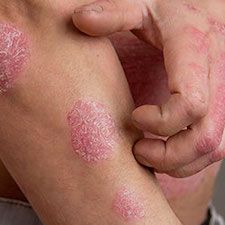News
Article
Health Barriers Identified for Sexual, Gender Minority Patients with Chronic Inflammatory Skin Diseases
Author(s):
This study also found a particularly high rate of such obstacles for SGM patients who also identify as being either non-Hispanic Black or Hispanic/Latino.

Sexual and gender minority (SGM) individuals with chronic inflammatory skin diseases (CISDs) are disproportionately impacted by cost-related and non-cost-related obstacles when seeking care, according to new findings, with the prevalence being especially high among non-Hispanic Black or Hispanic/Latino individuals.1
This new research was conducted to analyze the existence of such barriers based upon demographic data as well as SGM status. The investigators also sought to compare the prevalence of obstacles related and unrelated to cost for SGM and for non-SGM individuals.
The investigators noted that there is limited data on barriers to health care for those who are SGM and also have CISDs, though recent research did indicate a disproportionate burden of such obstacles for those who identify as Hispanic, non-Hispanic Black, Latino, or of Spanish origin.2 To address the lack of data, the new study was led by Michael R. Nock, BA, from the Department of Dermatology at Yale School of Medicine in New Haven, Connecticut.
“...(In) this study, we used survey data from participants in the National Institutes of Health’s All of Us Research Program to investigate the prevalence of cost and non-cost barriers to care among SGM and non-SGM patients with CISDs,” Nock and colleagues wrote.
Background and Findings
The research team used a cross-sectional design for the study, assessing data gathered from participants that had CISDs who had also joined the All of Us Research Program in the period between May 2017 and July 2022. The Program was known to be open to all adults from the US aged 18 or olde who were also not incarcerated and who were able to give consent.
Subjects for the study were recruited either online or as a result of actions by healthcare provider organizations found all across the US. The team followed the reporting guidelines required for survey studies.
Study subjects with reported CISDs were identified by the investigators through the use of specific medical codes that related to skin conditions such as psoriasis, rosacea, and hidradenitis suppurativa. They then grouped the participants into SGM if they had identified with such identities related to gender, sex assigned at birth, or sexual orientation.
Subjects that did not identify with such identities were placed into the category of non-SGM participants, and all were also put into groups that were based upon their self-reported race and ethnicity data.
Once the investigators took into account the data from the participants' demographics, they assessed the existence of barriers to patient health care which were shown to be based on SGM status. They notably considered a range of different obstacles to care, including ones which related to costs and other factors.
To assess these barriers to care, the research team utilized data drawn from the Health Care Access and Utilization Survey. The Survey covered subjects’ experiences in the year prior to the new survey.
Overall, the investigators identified 19,743 subjects that were shown to have CISDs, and 1877 of these individuals identified as SGM. The SGM participants’ mean age was also noted as 40.5, with 64.2% having been assigned female at birth.
Additionally, the research team found that 17,866 of the subjects were found to be non-SGM and they had a mean age 57.1, with a total of 73.9% being assigned female at birth.
Those in the SGM arm that had CISDs, when compared to non-SGM subjects, had a higher rate of delaying mental health care (1.62 times more likely), specialist care (1.23 times more likely), and filling of prescriptions (1.30 times more likely) as a result of cost-related issues.
The investigators also found that they were more likely to delay health care as a result of transportation problems (1.49 times more likely) and not having a practitioner with shared background characteristics. Additionally, they found that SGM individuals reported a greater likelihood of not always being given the respect by their practitioners (1.47 times more likely) versus non-SGM subjects.
“By universally collecting this demographic information from all patients and taking the time to better understand the unique background, values, and goals of each of their patients, dermatologists can be better prepared to provide culturally responsive care to SGM patients with CISDs,” they wrote.
References
- Nock MR, Kamal K, Zampella JG, Roberson ML, Cohen JM, Barbieri JS. Barriers to Care Among Sexual and Gender Minority Individuals With Chronic Inflammatory Skin Diseases in the US. JAMA Dermatol. Published online September 27, 2023. doi:10.1001/jamadermatol.2023.3328.
- Nock MR, Barbieri JS, Krueger LD, Cohen JM. Racial and ethnic differences in barriers to care among US adults with chronic inflammatory skin diseases: A cross-sectional study of the All of Us Research Program. J Am Acad Dermatol. 2023;88(3):568-576. doi:10.1016/j.jaad.2022.09.054.



